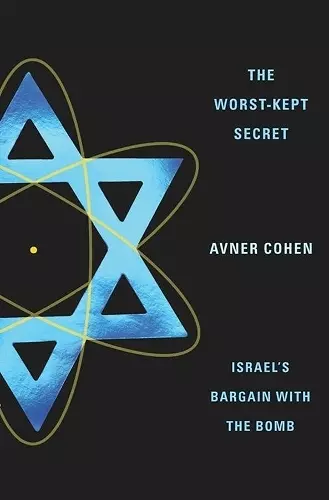The Worst-Kept Secret
Israel's Bargain with the Bomb
Format:Paperback
Publisher:Columbia University Press
Published:10th Feb '12
Currently unavailable, and unfortunately no date known when it will be back

Cohen reveals himself once again to be the reigning authority on the history of the Israeli bomb. Brilliant, compelling, and definitive -- Richard Rhodes, Pulitzer Prize-winning author of The Making of the Atomic Bomb
Israel has made a unique contribution to the nuclear age. It has created a special "bargain" with the bomb. Israel is the only nuclear-armed state that does not acknowledge its possession of the bomb, even though its existence is a common knowledge throughout the world. It only says that it will not be the first to introduce nuclear weapons to the Middle East. The bomb is Israel's collective ineffable--the nation's last great taboo. This bargain has a name: in Hebrew, it is called amimut, or opacity. By adhering to the bargain, which was born in a secret deal between Richard Nixon and Golda Meir, Israel has created a code of nuclear conduct that encompasses both governmental policy and societal behavior. The bargain has deemphasized the salience of nuclear weapons, yet it is incompatible with the norms and values of a liberal democracy. It relies on secrecy, violates the public right to know, and undermines the norm of public accountability and oversight, among other offenses. It is also incompatible with emerging international nuclear norms. Author of the critically acclaimed Israel and the Bomb, Avner Cohen offers a bold and original study of this politically explosive subject. Along with a fair appraisal of the bargain's strategic merits, Cohen critiques its undemocratic flaws. Arguing that the bargain has become increasingly anachronistic, he calls for a reform in line with domestic democratic values as well as current international nuclear norms. Most ironic, he believes Iran is imitating Israeli amimut. Cohen concludes with fresh perspectives on Iran, Israel, and the effort toward global disarmament.
Cohen's second outstanding book on Israel's nuclear project, and the veil of ambiguity that has swathed it from inception, provides a richly detailed account of its history and a provocative analysis of its future. Cohen shows how Israel's beleaguered national existence and persistent Holocaust memories led to the taboo on any acknowledgment of its nuclear weapons program, which cannot, in his view, any longer serve Israel's interests. This is a splendid work of historical research as well as a thought-provoking challenge for both current and future Israeli and American policymakers. -- Samuel Lewis, U.S. Ambassador to Israel, 1977-1985 This important book should be read by anyone interested in understanding the changes that Israel will need to make in its nuclear program as the world reduces reliance on nuclear weapons. Cohen makes a compelling case for why it is in Israeli's interest to confirm its nuclear weapons program and participate in efforts to reduce reliance on nuclear weapons. -- Morton H. Halperin, senior advisor, Open Society Institute Avner Cohen has written the most informed history of Israel's secret drive to get the bomb, and now he has gone further. In The Worst-Kept Secret, he describes and explains Israel's insistence that all talk or writing about its nuclear arsenal be exorcised from public discourse. The nuclear "taboo," as Cohen depicts it, continues unabated today, undermining Israeli democracy at home and its credibility abroad. -- Seymour M. Hersh, author of The Samson Option: Israel's Nuclear Arsenal and American Foreign Policy Cohen's persistent research and numerous books and articles have set the standard in the field and serve as an unrivaled source for anyone interested in Israel's biggest taboo. The Worst-Kept Secret provides a firm factual basis upon which our knowledge about Israel's nuclear program, with its richness of historic detail and personal anecdotes, rests. Moreover, it lays out a wide-ranging theoretical framework for discussing the pros and cons of Israel's amimut policy and its prolonged effect on the country's democracy and governance and its possible future revision. This book will undoubtedly serve as the new benchmark for studying and debating its topic. -- Aluf Benn, editor-at-large, Haaretz [Cohen's] exploration of the issues is thoughtful, measured and deep, and very much worthy of wide consideration. -- Ethan Bronner New York Times A brave, provocative, and very important book. -- Bruce Riedel Haaretz
ISBN: 9780231136990
Dimensions: unknown
Weight: unknown
416 pages